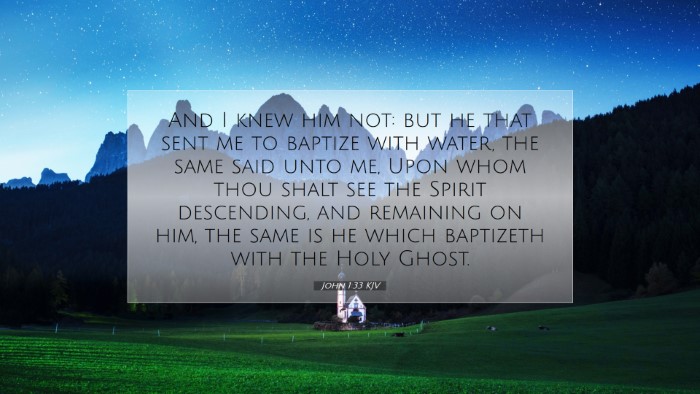Commentary on John 1:33
Verse Context: John 1:33 states, "And I knew him not: but he that sent me to baptize with water, the same said unto me, Upon whom thou shalt see the Spirit descending, and remaining on him, the same is he which baptizeth with the Holy Ghost."
This passage reveals a profound moment of revelation in the ministry of John the Baptist. It highlights the relationship between John and Jesus, emphasizing John's role as the forerunner and the divine confirmation of Jesus' identity and mission.
Insights from Matthew Henry
Matthew Henry comments on the divine appointment of John the Baptist, stressing that he was called to prepare the way for Christ. He notes that John's initial lack of recognition of Jesus underscores the humility and obedience that characterize true servanthood in ministry.
- The Mystery of Divine Revelation: John admits, "I knew him not," which suggests that even those called to bear witness to Christ might not fully comprehend their mission without divine revelation.
- Divine Assurance: Henry points out that God had provided John with a specific sign to identify Jesus—the descent of the Spirit, confirming Jesus’ divine authority as the Messiah.
- Baptism with the Holy Spirit: The reference to Jesus baptizing with the Holy Spirit demonstrates the transformative power of Christ's ministry as opposed to John's water baptism, which was preparatory in nature.
Insights from Albert Barnes
Albert Barnes emphasizes the significance of the Spirit's descent at Jesus' baptism, equating it to a divine endorsement. He elaborates on the implications of the baptism with the Holy Spirit as a promise fulfilled in the life of the believer.
- John's Reluctance: Barnes highlights that John's acknowledgment of not knowing Jesus implies a personal and evolving understanding of Jesus' identity and mission.
- Confirmation of Jesus' Role: The Spirit's descent indicates Jesus as the chosen one, aligned with Old Testament prophecies regarding the Messiah.
- Transcendence of Jesus' Baptism: The distinction between water baptism and the baptism of the Holy Ghost elevates the spiritual significance of Jesus' ministry, which is aimed at heart transformation.
Insights from Adam Clarke
Adam Clarke provides a deeper theological reflection on the implications of the verse, focusing on the symbolism of the Holy Spirit and its connection to the New Covenant. He comments extensively on the transformative nature of the Holy Spirit in the believer's life.
- Spiritual Newness: Clarke notes that Jesus' ability to baptize with the Holy Spirit signifies the initiation of a new spiritual era, differing from the Old Covenant practices.
- Identity Affirmation: The descent of the Spirit serves not only as a confirmation of Jesus’ identity but also establishes a paradigm for believers’ experiences of baptism and empowerment.
- Eschatological Significance: Clarke discusses the eschatological implications of the Holy Spirit's role, suggesting that this event marks the beginning of the fulfillment of God's promises regarding His Spirit's outpouring upon all flesh.
Theological Reflections
The implications of John 1:33 reverberate across theological contexts. For pastors and theologians, this verse serves as a reminder of the importance of divine revelation in ministry. It underscores the call for earnest seeking of God's Spirit for guidance and empowerment in their spiritual work.
- Ministry Authorship: Recognizing that ministry is not merely functional but rooted in God's revelation challenges leaders to seek authentic encounters with Christ.
- Empowerment for Service: The promise of the Holy Spirit empowers believers for service and witness in the world, establishing continuity between baptism in water and baptism in the Spirit.
- Role of the Holy Spirit: Understanding the Holy Spirit’s role necessitates a deeper examination of how believers today receive and act upon His leading in their lives.
Conclusion
In summary, John 1:33 encapsulates a pivotal moment in the Gospel narrative, revealing essential truths about the identity of Jesus and the transformative power of the Holy Spirit. By analyzing insights from Matthew Henry, Albert Barnes, and Adam Clarke, we see the multifaceted dimensions of this verse that speak to the heart of Christian faith and practice. For scholars, students, and pastors, it calls for a deeper engagement with the Scriptures and an openness to the ongoing revelation of Christ through the Spirit.


